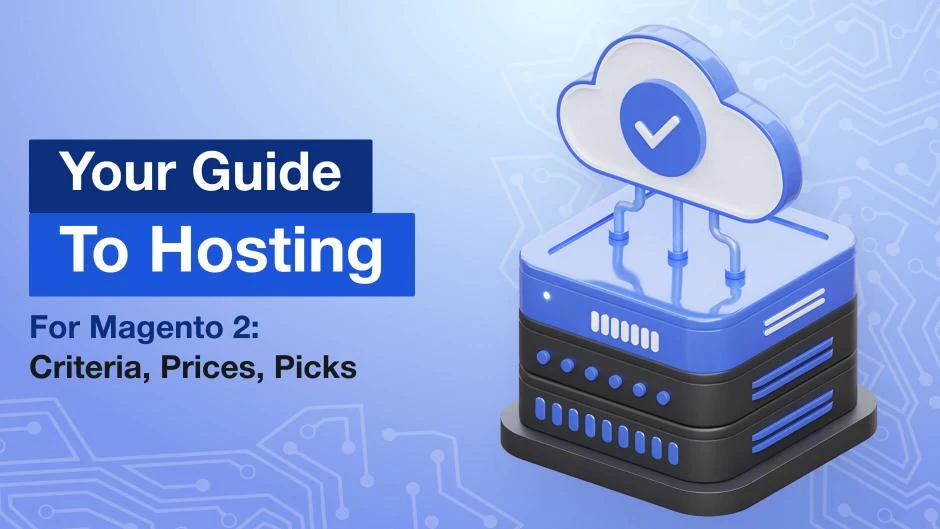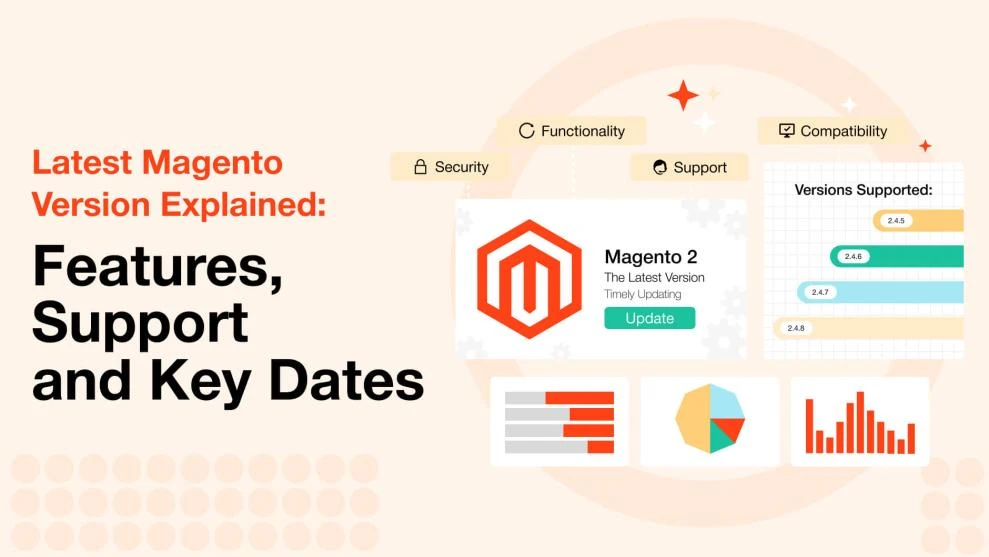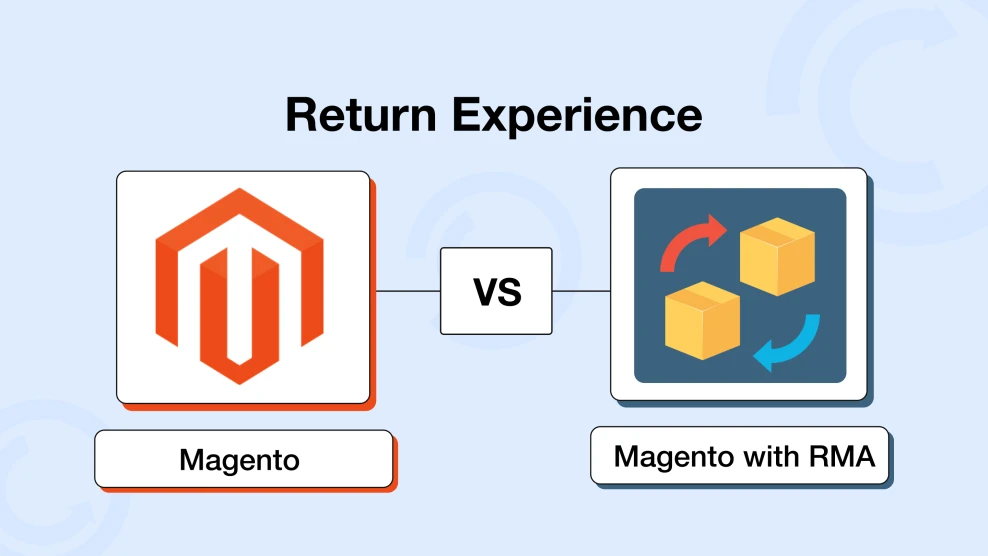Best Magento 2 Hosting Providers for Your Online Store
-
 Oleksandra Petrenko
Oleksandra Petrenko
- E-commerce Tips & Best Practices
- Updated: Oct 7, 2025
- 16 min read
Choosing the right Magento 2 hosting affects site speed, uptime, and how quickly you can scale.
In this article, you will find a quick comparison table to shortlist options, clear criteria to evaluate them, and concise profiles that explain features, advantages, and limitations.
We also match recommendations to common store scenarios from startup to enterprise, so you can align a platform with your traffic, budget, and risk.
- Magento 2 Hosting: Selection Criteria at a Glance
- Quick Comparison: Top 10 Providers
- How to Evaluate a Host for Your Store
- Provider Profiles & Key Takeaways
- Picks by Store Size and Traffic
- Conclusion
- FAQ
Magento 2 Hosting: Selection Criteria at a Glance
Before we compare providers, we align on what matters most so you can evaluate options consistently and save time. Use this checklist to identify Magento-optimized hosting quickly. It starts with business goals, with technical specifics after the colon for your team.
- Total cost is clear today and at renewal: transparent pricing, renewal terms, shared vs VPS vs cloud plans, pay-as-you-go or fixed.
- Uptime matches your risk level: SLA 99.9–99.99 percent, redundancy, failover, and credits for outages.
- Real feedback from merchants, not just marketing: Trustpilot, Reddit, Magento and webhosting, Magento StackExchange; stability, support quality, admin usability.
- Independent checks and roundups are positive: TechRadar, HostingAdvice, Diggity Marketing, Amasty Blog, Magestore Blog, CyberNews, EmailVendorSelection.
- Speed where your customers are: global data centers, CDN, NVMe SSD, HTTP/2, or HTTP/3.
- Room to grow without a rebuild: elastic CPU, RAM, and storage, autoscaling, options on AWS or GCP.
- Security in place, backups ready: WAF, DDoS protection, SSL, PCI, daily backups, quick restore.
- Support that actually answers: 24/7 chat, phone, and tickets, response time targets, and Magento familiarity.
- A setup tuned for Magento: Redis, Varnish, Elasticsearch or OpenSearch, PHP 8.x, staging, SSH, Git.
How We Evaluated
- Reputation and visibility. Recognition in independent reviews and Magento community mentions.
- Merchant feedback. Recent discussions and reviews reveal stability, support quality, and panel usability.
- Magento readiness. Out-of-the-box tuning and tooling (Redis, Varnish, Elasticsearch or OpenSearch, PHP 8.x, HTTP/2 or HTTP/3, staging, SSH, Git).
- Reliability and SLA. Stated uptime targets and remedies for downtime, plus backup and restore steps.
- Global performance. Data center options and CDN integration for your target markets.
- Pricing clarity. Entry pricing versus renewal terms and plan limits.
- Support depth. Availability and actual expertise, not only channels.
Begin with the table to narrow options by segment and price. Check regions to confirm latency for your markets. Then dive into the profiles for context and caveats.
Quick Comparison: Top 10 Providers
How to read: start with Segment and For business to match budget and risk; scan For developers if your team needs Magento-specific tooling; confirm Price (from) and Regions/DC for TCO and latency.
| No | Provider | Capabilities | Regions / DC & Segment | Price (from) |
|---|---|---|---|---|
| 1 | Cloudways | For business: Flexible pay-as-you-go, quick start, and scaling without switching hosts. For developers: DO/AWS/GCP/Linode/Vultr; Redis, Varnish, staging, auto-healing, HTTP/2/3. |
Regions/DC: Global via chosen cloud (US/EU/Asia, etc.) Segment: Balanced (SMB→Mid/Enterprise) |
$11/mo |
| 2 | Nexcess | For business: Managed Magento with SLA, CDN, autoscaling, and expert support. For developers: Magento-optimized stack (Varnish/Redis/Elasticsearch), PCI, 24/7 monitoring. |
Regions/DC: US, UK, Netherlands, Australia (by plan) Segment: Enterprise-ready |
$37.74/mo promo (XS, first 3 months) |
| 3 | SiteGround | For business: Easy panel and strong support; reliable Google Cloud-based. For developers: Staging, Git, caching, PHP 8+, SSH. |
Regions/DC: Google Cloud DCs across US/EU/APAC Segment: SMB |
$2.99/mo promo → renews $17.99/mo (StartUp, 12-mo) |
| 4 | Hostinger | For business: Very low entry cost; simple panel; domain+SSL on many plans. For developers: KVM VPS, NVMe, automated backups, CDN (hPanel). |
Regions/DC: US, BR, FR, LT, IN (VPS); broader DCs on other plans Segment: SMB |
$4.99/mo promo (VPS KVM 1) → renews $9.99/mo |
| 5 | InMotion Hosting | For business: Good price/performance for growing stores; free migrations. For developers: NVMe, UltraStack, panels, staging. |
Regions/DC: US (Los Angeles, Ashburn), EU (Amsterdam), Asia (Singapore) Segment: Balanced (SMB→Mid) |
from $9.99/mo (VPS 4 vCPU promo) |
| 6 | HostPapa | For business: Budget shared hosting; cPanel; 24/7 support. For developers: Shared/VPS, Softaculous, SSL. |
Regions/DC: Canada, US, Europe (incl. Amsterdam) — varies by plan Segment: SMB |
from $2.95/mo promo (Shared); Managed VPS from ~$36.99/mo |
| 7 | FastComet | For business: Low entry; transparent renewals; responsive support. For developers: Magento-oriented caching, cPanel, and daily backups. |
Regions/DC: 12 DCs worldwide (US/EU/APAC/SA) Segment: SMB |
from $3.95/mo (Shared; fixed renewals) |
| 8 | MGT-Commerce | For business: Premium AWS-based managed Magento; expert support. For developers: Magento-ready environment, autoscaling options, Varnish. |
Regions/DC: Global via AWS Segment: Specialized/Enterprise |
€149–€199/mo (Single Server) |
| 9 | Webscale | For business: Built for high-traffic peaks; deep observability. For developers: Autoscaling, self-healing, WAF/PCI, multi-cloud. |
Regions/DC: Multi-cloud (AWS/Azure/GCP) — global Segment: Enterprise |
Custom (contact sales) |
| 10 | Rackspace | For business: Single-tenant/bare-metal; custom SLAs and managed services. For developers: Dedicated servers, custom configs, managed ops. |
Regions/DC: Global DC footprint (US/EU/APAC) Segment: Enterprise |
Custom (contact sales) |
Note: Prices are starting rates as of October 2025 and may change. Please confirm current pricing and renewal terms on the provider’s site.
How to Evaluate a Host for Your Store
You have the quick comparison in front of you. Before we move to individual providers, this section explains what to pay attention to and why, so the profiles are easier to scan and the trade-offs are clear.
1. Start with cost
Check the entry price, the renewal price, and what each tier actually includes. Note limits on traffic, storage, and backups, and whether extras such as a CDN are bundled or billed separately. Managed Magento hosting may be pricier, but it often lowers operational risk and saves time.
2. Look at uptime and recovery
Prefer a published SLA in the 99.9 to 99.99 percent range, with specific remedies if targets are missed. Ask where backups live and how long a restore takes in practice. A public status page and active monitoring are good signs.
3. Consider the speed at which your customers are
Choose data centers close to your buyers, and enable a CDN for other regions. NVMe storage and HTTP/2 or HTTP/3 help with large catalogs. Caching layers such as Redis and Varnish are standard for fast Magento 2 hosting, and they matter for conversion and SEO.
4. Plan for growth
Cloud hosting for Magento should let you scale CPU, RAM, and storage without rebuilding your setup. A safe staging site and simple rollbacks make releases and promotions easier. Confirm support for PHP 8.x and Elasticsearch or OpenSearch.
5. Keep security routine, not ad hoc
Look for SSL, a firewall or WAF, DDoS mitigation, and daily backups with an easy restore path to maintain a secure Magento server. If you process cards, ask about access controls, two-factor authentication, and PCI guidance.
6. Make sure support closes the loop
You want real 24/7 coverage with response targets, not only a list of channels. Migration help, Magento familiarity, and clear handoffs between tiers reduce downtime when something breaks.
When options look similar, rely on tiebreakers: useful logs, proactive alerts, and clear runbooks are worth more than a long feature list. Avoid unclear renewals, missing backups, vague SLAs, or hidden fees.
With this lens in mind, the provider profiles that follow will show who each host suits, where it shines, and what to watch.
Provider Profiles & Key Takeaways
Cloudways
Cloudways is one of the best cloud Magento hosting providers, offering reasonably priced subscriptions for beginner-level online retailers and premium packages for established brands. The final cost depends on the chosen cloud provider, server parameters, and any additional extensions.
You can run multiple Magento storefronts on a single server and add the necessary add-ons as needed.
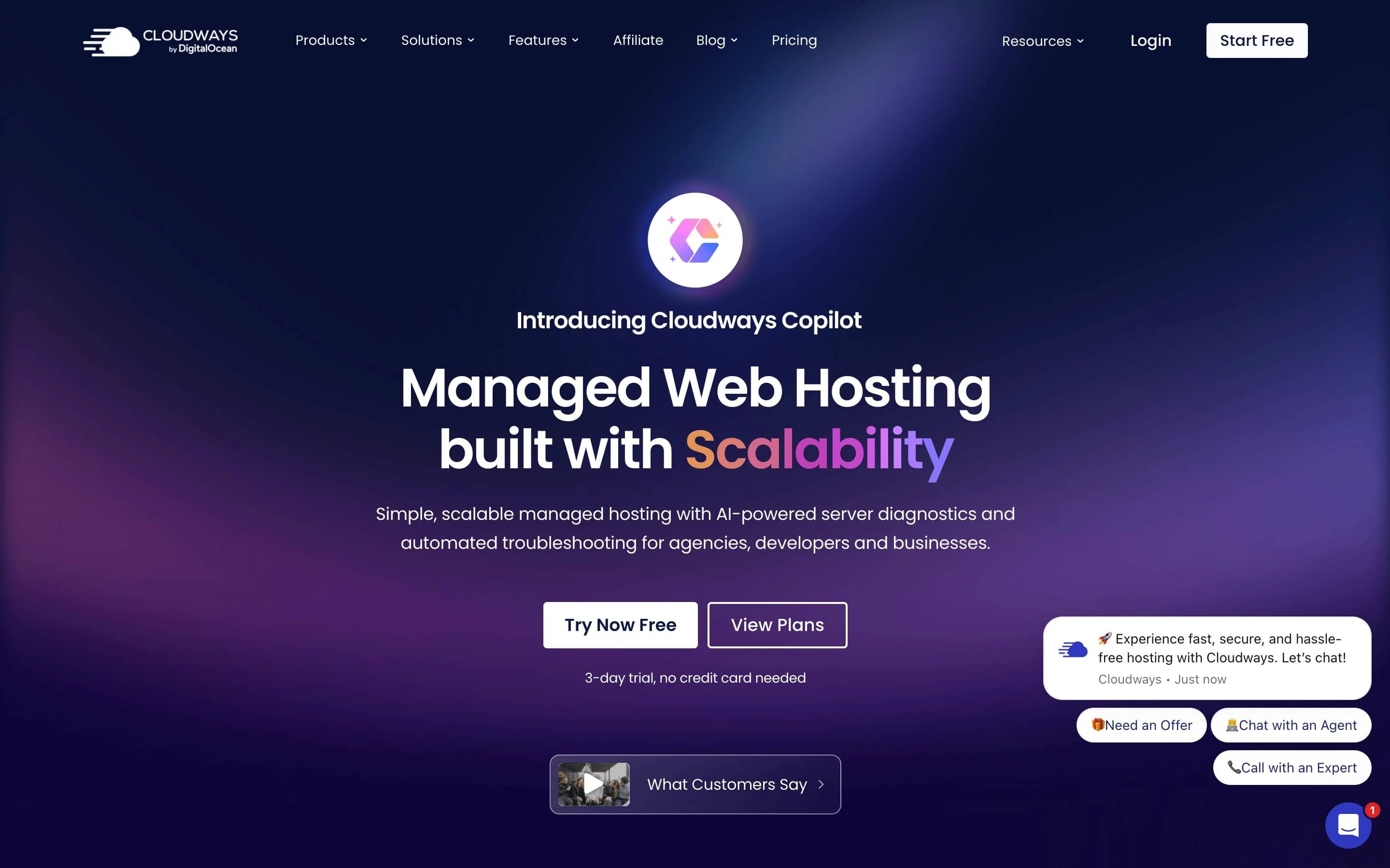
Features
- Different Providers: DigitalOcean, AWS, and Google Cloud.
- Fast Support and monitoring in real time.
- Free SSL certificates and security patching.
- Free migration to Cloudways.
- Access management to grant different access levels for staff members.
- Dedicated firewalls to block suspicious traffic and unauthorized access.
- Automated backups for smooth recovery.
- Optimized cache and CDN to improve website speed worldwide.
- HTTP/2-enabled servers for faster communication.
- SSH and SFTP for secure file access.
Advantages
- Multi-cloud choice (DO/AWS/GCP/Linode/Vultr)
- Staging/cloning and cache are ready to use
- Backups and monitoring in the dashboard
Limitations
- Needs baseline server know-how
- App-level security and compliance on you
- No deep OS/network troubleshooting
Nexcess
Nexcess is a top provider offering shared, dedicated, and cloud plans for stores at different stages. Pricing depends on the platform, resources, and add-ons you choose. While these plans cost more than a generic VPS, strong optimization and security make these hosted solutions for Magento a solid choice for established brands.
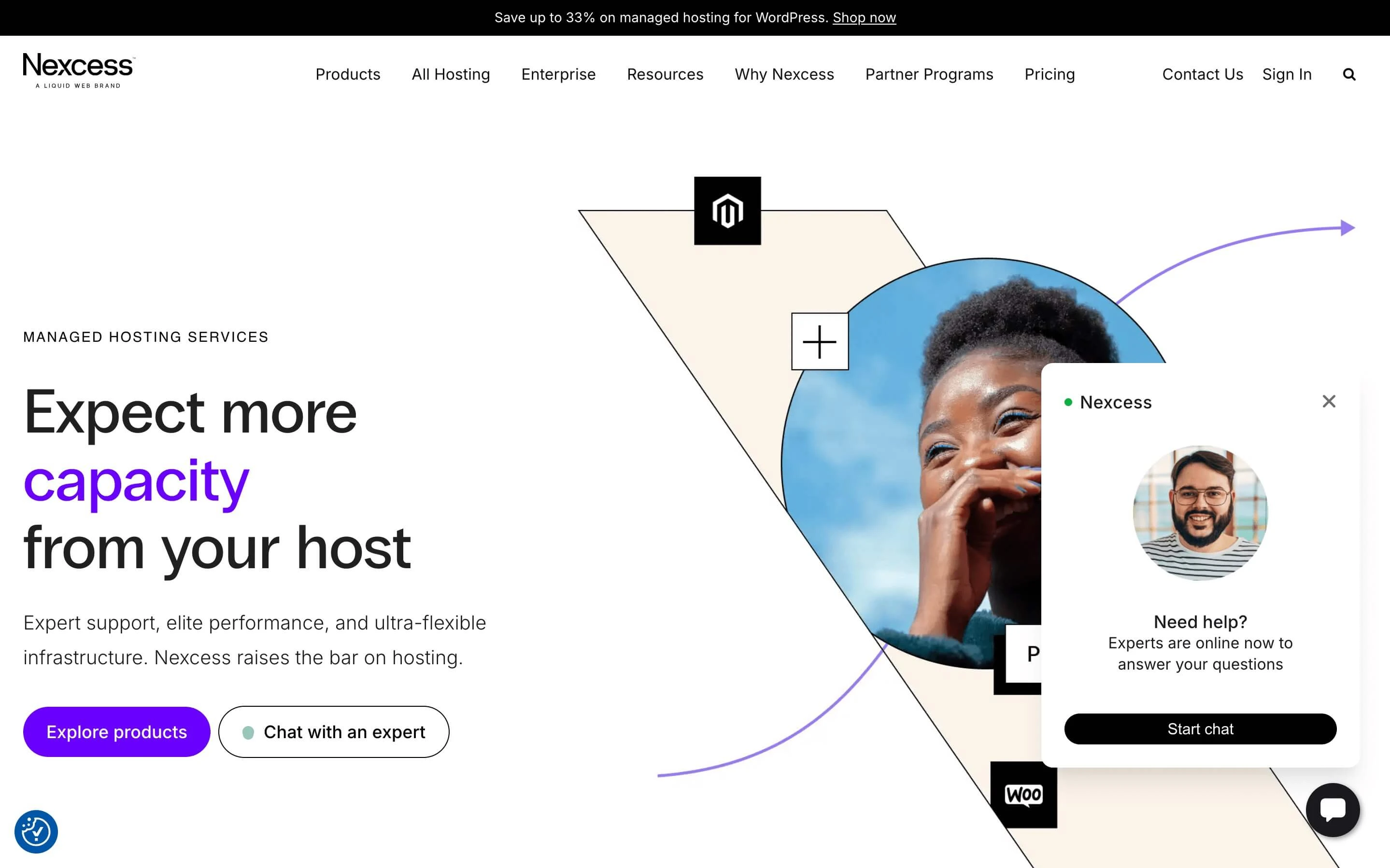
Features
- Server-side PHP for dynamic content and customization
- Dedicated IP addresses for security and PCI
- Instant autoscaling for peak traffic
- Performance testing and fast troubleshooting
- CDN and advanced caching for fast loading worldwide
- 24/7 security monitoring
Advantages
- Magento-tuned stack
- 24/7 monitoring on a managed platform
- Robust security practices
- Global CDN for quick load times
- Autoscaling of Magento server resources
Limitations
- Pricier than a generic VPS
- Many managed features are on higher tiers
- Limited underlying cloud choice
- Less low-level control than VPS/dedicated
SiteGround
SiteGround runs on Google Cloud. The panel is straightforward, and support is quick to respond, which suits smaller Magento stores that want stability without extra admin work.
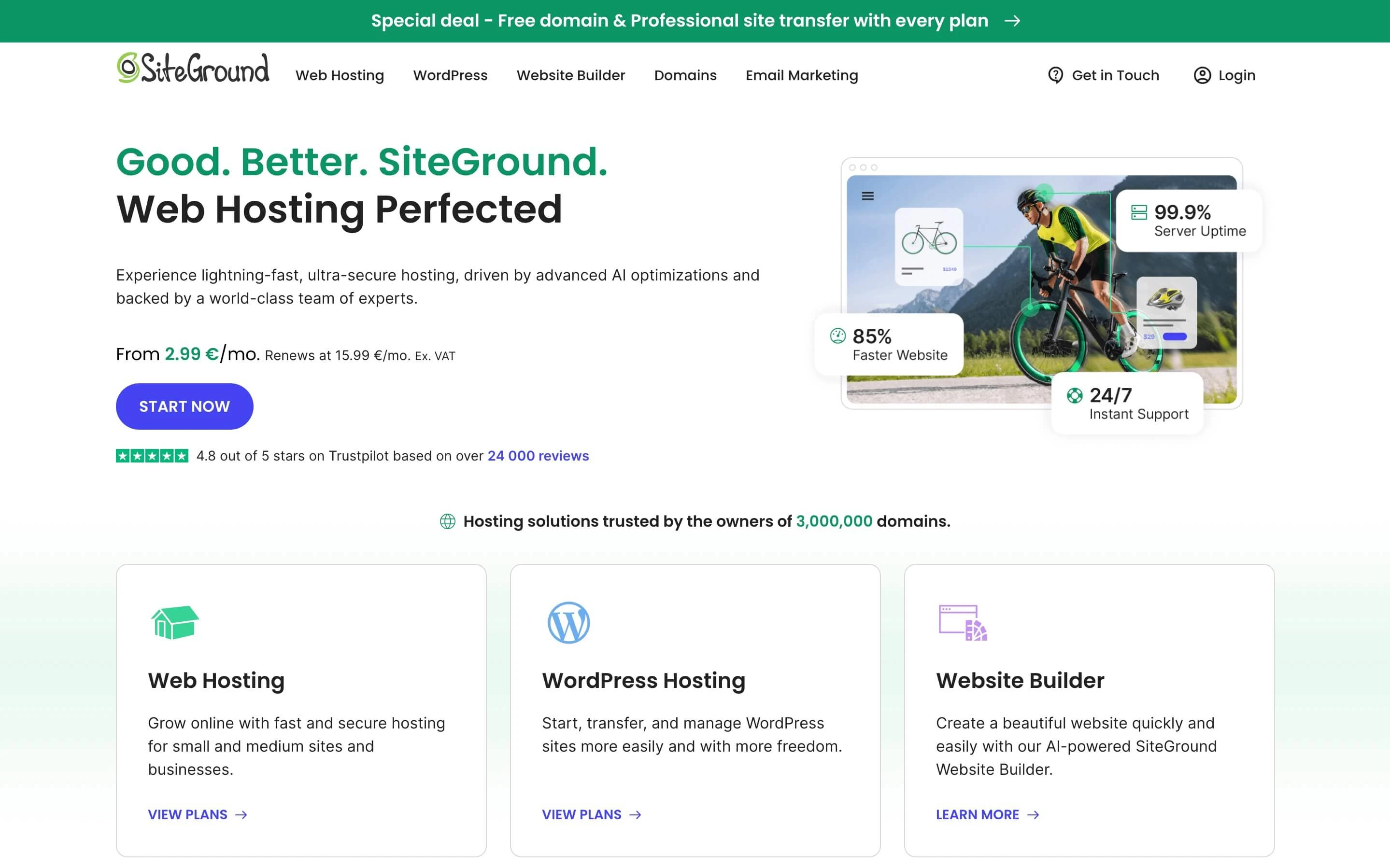
Features
- Google Cloud platform; PHP 8+
- Staging & Git for safe updates
- In-house caching; free SSL; SSH access
- CDN available
- Daily backups with quick restore
- Data centers in the US/EU/APAC
Advantages
- Google Cloud backbone with SG Optimizer caching
- Easy-to-learn Site Tools panel; fast support responses
- Staging and Git simplify testing and rollbacks
Limitations
- Shared plans can throttle under heavier Magento workloads
- Upgrades to higher tiers (GrowBig/GoGeek/Cloud) are often needed as you scale
- Not a Magento specialist; deep tuning is usually done by your team
Hostinger
Hostinger offers cloud hosting for Magento 2 with solid baseline performance and general functionality. However, it does not provide a dedicated environment or deep platform expertise, or add-ons.

Features
- Cloud hosting plans with unlimited websites and a free domain
- Free SSL certificate
- Simple Magento installation
- DDoS protection and automated backups
Advantages
- Domain registration and migration
- Affordable plans from $4 per month
- Up to 100 websites on the starter plan with 200 GB storage
- Free CDN and SSL certificate
- Unlimited resources on selected plans
- Advanced caching solutions
Limitations
- No dedicated IP address or priority support on basic plans
- Limited Magento expertise
- No adjustable scaling for unpredictable traffic growth
- Less Magento-oriented environment
InMotion
InMotion provides VPS on UltraStack with NVMe and advanced caching, giving predictable performance and straightforward migrations for Magento stores.
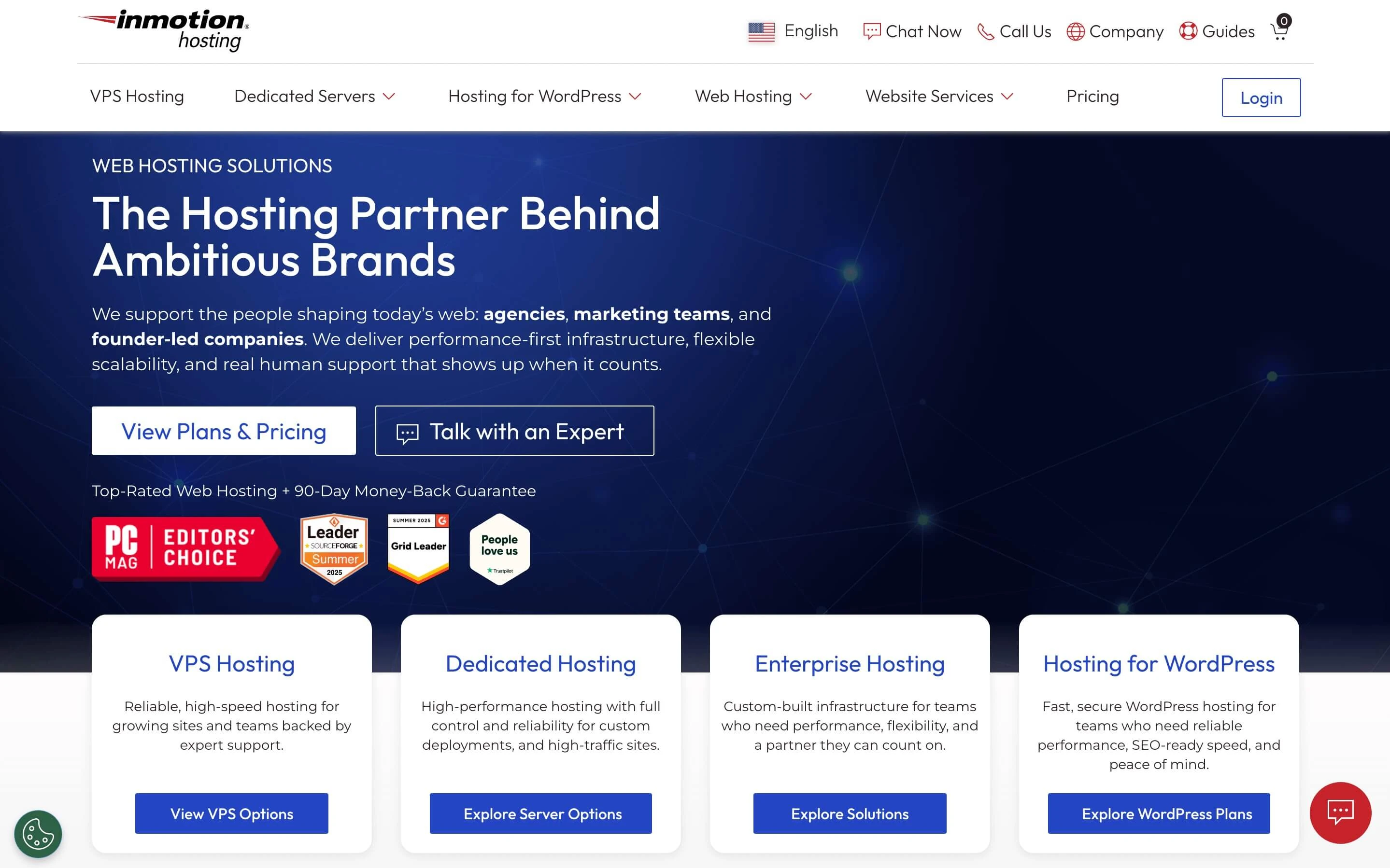
Features
- UltraStack on NVMe with advanced caching
- Dedicated IPs and quick resource upgrades
- cPanel/WHM for admin control
- Elasticsearch or OpenSearch support
- Firewalls and hardening tuned for Magento
Advantages
- Managed VPS with room to grow
- Migration help and quick support replies
- NVMe + caching shortens page loads
- Simple setup and light day-to-day upkeep
- SSL and security tools included
Limitations
- Shared tiers have limited Magento expertise
- Renewals cost more than intro rates
- Entry plans deliver modest performance
HostPapa
HostPapa is widely regarded for its affordability and small-business focus. The platform offers shared hosting for Magento with 100 GB of storage and a free domain. Pricing starts at $3 per month for one website, and the Plus plan supports up to 10 web stores for $6 per month.
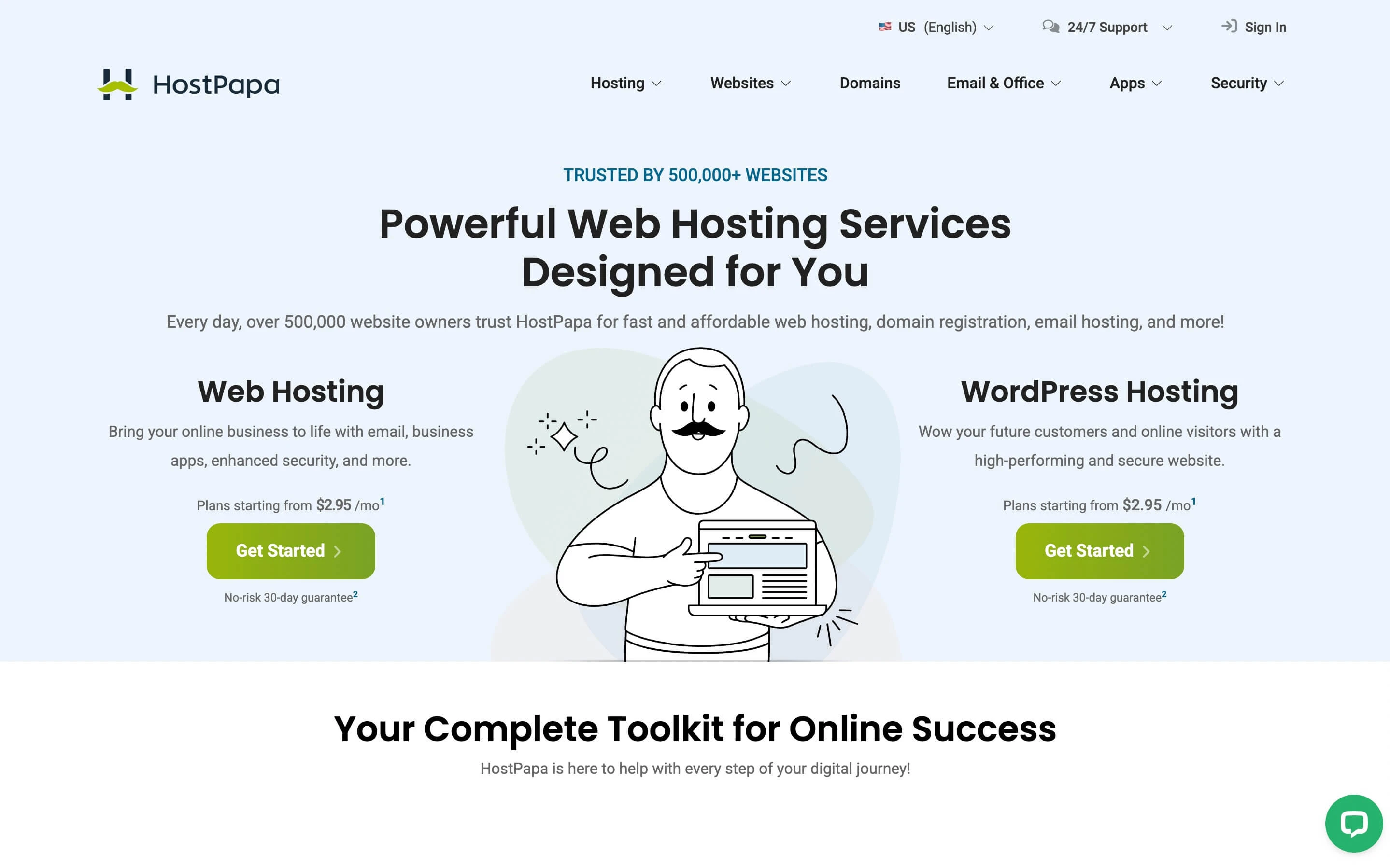
Features
- 10 email addresses
- Free SSL certificate
- Cloudflare-compatible, CloudLinux-based servers
- Softaculous installer with 400+ apps
Advantages
- $3/month entry price
- Familiar cPanel dashboard
- Basic speed tuning in place
- After-hours support via phone, chat, and web
Limitations
- General hosting support, not Magento-specific
- Shared plans may slow during traffic spikes
- Limited scalability on shared tiers
- No advanced caching or managed security included
FastComet
FastComet offers budget-friendly shared plans that make an easy entry point for Magento stores. As traffic grows, you can move to VPS plans and allocate CPU, RAM, and storage more precisely to keep performance steady.
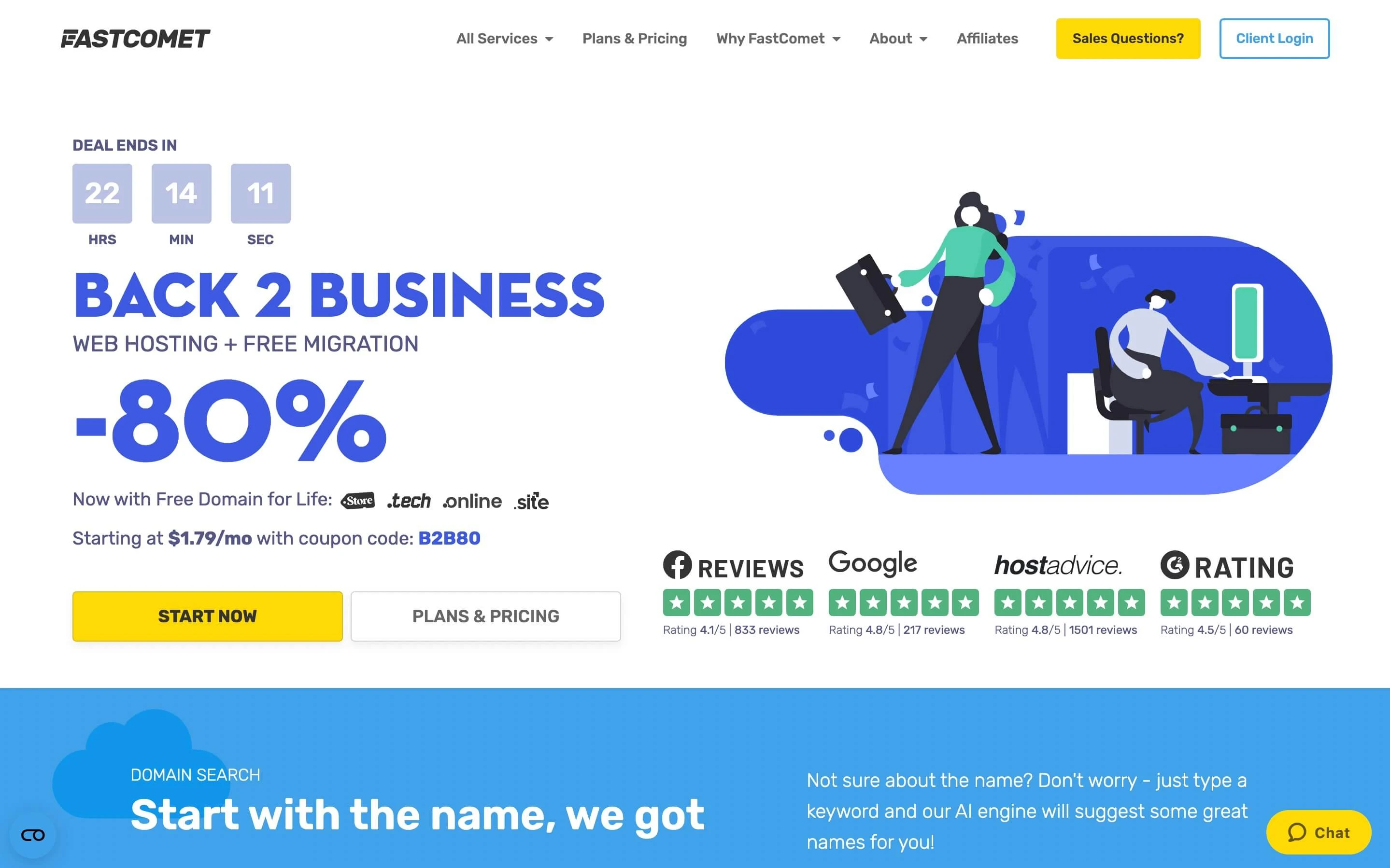
Features
- Scalable hosting: start on shared, upgrade to VPS as you grow
- Advanced caching on servers tuned for Magento
- Free SSL and added security measures
- Softaculous installer for one-click Magento setup
- 24/7 support
Advantages
- Affordable entry
- Painless scaling to VPS
- Stable performance on Magento-tuned servers
- Quick setup for new stores
- Extra security with included SSL
Limitations
- Shared plans can slow under higher traffic
- Less Magento-specific expertise than specialist hosts
MGT-Commerce
MGT-Commerce is an AWS-based Magento specialist with premium support. It suits brands that want enterprise patterns such as autoscaling and redundancy without staffing a cloud team.
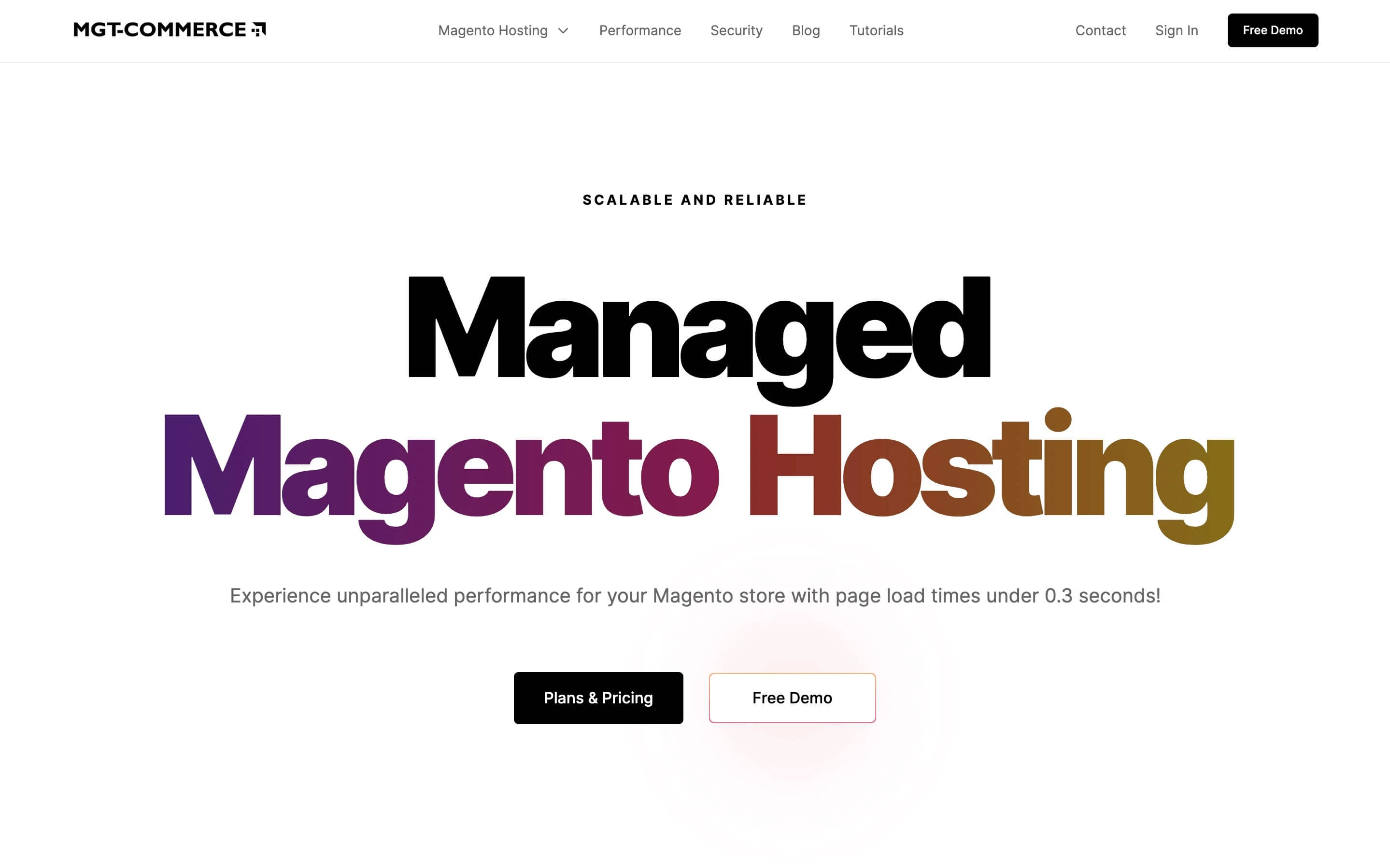
Features
- Magento-ready AWS environments with Varnish and Redis
- Single-server and multi-server topologies with autoscaling
- CI/CD options, staging, and SSH
- 24/7 monitoring, backups, and restore
- Global coverage via AWS regions
Advantages
- Deep Magento expertise
- Autoscaling and redundancy on AWS
- Clear upgrade path as traffic grows
Limitations
- Higher monthly cost than a generic VPS
- AWS-focused architecture
- Complex custom work may require cloud engineers
Webscale
Webscale targets enterprise retailers with peak-traffic needs. It provides observability, WAF, CDN, and autoscaling for launches and flash sales.

Features
- Autoscaling and self-healing across clouds
- Global CDN with integrated WAF
- Deep observability, logging, and alerts
- Multi-cloud options (AWS, Azure, GCP)
- 24/7 managed support and SLAs
Advantages
- Built for peak events and rapid campaigns
- Strong visibility and security posture
- SRE-style operations for complex setups
Limitations
- Custom pricing and a higher total cost
- Less low-level control than DIY VPS
- Best fit for larger teams and budgets
Rackspace
Rackspace provides Magento-capable hosting for established storefronts with strong technical resources. Plans scale easily, but teams need solid technical guidance to get the most from advanced features.
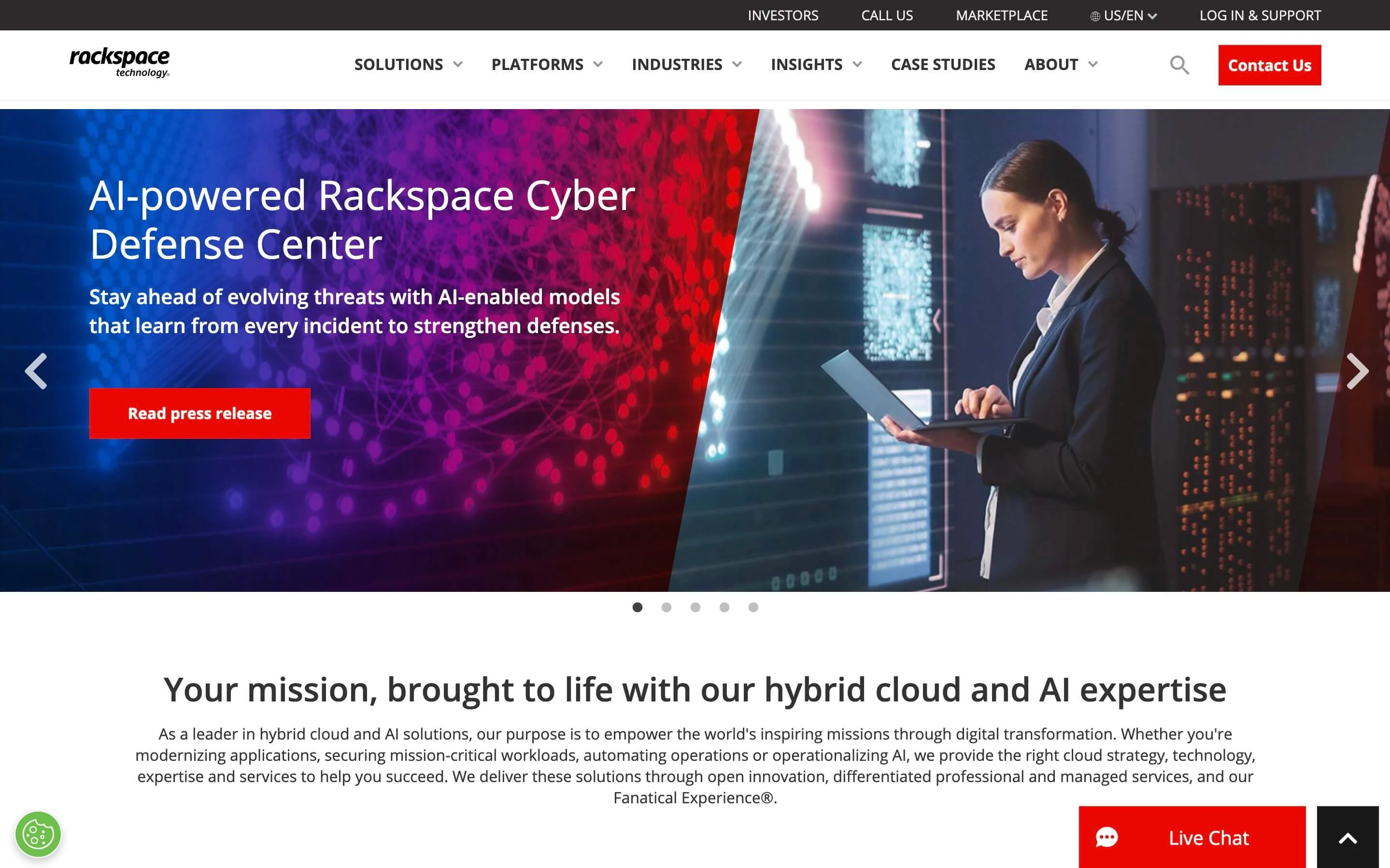
Features
- Rapid resource scaling for peak traffic
- Dedicated and private cloud options beyond shared hosting
- Access to Magento specialists on premium tiers
- Advanced security features with optional managed security services
Advantages
- Optimized performance for heavy traffic
- Easy scaling and growth
- Expert Magento support available on higher plans
- Strong data security measures
Limitations
- Requires more in-house expertise
- Premium tiers are costly compared to shared hosting
- Often not ideal for small, low-traffic stores
Picks by Store Size and Traffic
Use the comparison as a starting point, then apply it to your traffic and budget to pick a managed path for your Magento 2 hosting.
Start up store (≈5–10k visits/month)
You’re validating demand and watching every dollar. Prioritize a low entry price, a simple control panel, SSL by default, and daily backups with a straightforward restore.
Hostinger is a pragmatic first step on a budget VPS when you need to get live quickly. FastComet suits teams that value predictable renewals and a wide choice of data centers from day one.
If your team prefers classic cPanel, HostPapa keeps the learning curve gentle while you get the catalog online.
Growing store (≈50–100k visits/month)
Traffic is climbing, promotions are regular, and releases need a safety net. Look for staging and easy rollbacks, dependable backups, and the ability to scale resources without a migration project.
Cloudways offers flexible cloud choices and practical release tooling, which helps when campaigns spike traffic. SiteGround pairs approachable management with Google Cloud reliability for teams that want solid support.
InMotion Hosting provides a good price-to-performance VPS foundation when you need more headroom without jumping to enterprise tooling.
Scaling/high-traffic store (≈200–500k visits/month)
Sustained sales and frequent campaigns raise the stakes on uptime and speed. Aim for 99.99%-class targets, a global CDN, tuned caching (Redis/Varnish), and proactive monitoring.
Nexcess brings Magento-specific optimization and autoscaling that keep pages responsive under load. If you want to stay flexible on cloud choice, Cloudways on AWS or GCP gives elastic capacity with familiar operations.
For teams standardizing on AWS with specialist help, MGT-Commerce adds premium guidance and scaling patterns.
Enterprise/peak-load store (1M+ visits/month, thousands concurrent at peaks)
Major launches, international traffic, and compliance needs call for more than raw horsepower. Expect multi-zone resilience, custom SLAs, deep observability, and 24/7 engineers who know Magento.
Webscale is built for peak events, combining autoscaling, self-healing, and detailed telemetry for busy seasons. Rackspace fits when isolation, governance, or bespoke architecture are non-negotiable.
Larger Magento programs also find a managed path with Nexcess Enterprise, which bundles the platform and operations into one contract.
If you sit between tiers, choose the platform that supports the next stage without a rebuild and test on a staging environment before committing changes to live.
Conclusion
The best hosting for a Magento 2 store is the one that proves itself in practice. Take your shortlist, deploy a staging copy in your target region, and measure checkout speed, admin actions, and a full backup restore.
Open a real support ticket and confirm renewal pricing and upgrade paths before you commit. Choose the platform that keeps operations calm, pages quick, and leaves headroom for your next campaign.
FAQ
How much does Magento hosting cost?
Magento 2 hosting costs scale with traffic, catalog size, and the level of management you want. Entry stores can start on low-cost shared/VPS plans; growing stores usually move to managed VPS/cloud with staging, backups, and CDN; high-traffic and enterprise workloads use clustered or autoscaling setups with strict SLAs. Always check renewal pricing and plan limits (visits, storage, backups), not just promo rates.
Which hosting is best for e-commerce on Magento 2?
The best choice depends on your stage and risk tolerance. For small catalogs, budget VPS/shared plans (e.g., Hostinger, FastComet, HostPapa) are enough to launch. For growing stores, flexible managed options with staging and backups (e.g., Cloudways, SiteGround, InMotion) reduce ops overhead. For sustained peaks or compliance needs, Magento-specialist and enterprise platforms (e.g., Nexcess, MGT-Commerce, Webscale, Rackspace) bring SLAs, autoscaling, and expert support.
How much RAM is needed for Magento 2?
A practical baseline is 4–8 GB RAM and 2–4 vCPU for a small catalog and modest traffic, plus extra memory for Elasticsearch/OpenSearch. As campaigns, extensions, or catalog size grow, monitor PHP workers, DB load, and cache hit ratios, then scale up accordingly.
Is Magento self-hosted?
Magento Open Source is self-hosted: you choose and manage the infrastructure and operations. Adobe Commerce can be self-hosted or run on Adobe’s cloud, but you still own extensions, data, and release processes.
Which is the best host for Magento?
There isn’t a single winner for every store. Match the pick to your scenario: budget/shared for very small catalogs, managed VPS/cloud for growing stores that need staging and reliable backups, and enterprise platforms for peak events and strict SLAs. Use the comparison table and provider profiles above to align features, regions, and SLA with your goals.
Do I need managed Magento hosting, or is a generic VPS enough?
Choose managed hosting if you want less operational overhead and a faster time-to-stability. A generic VPS is viable only if your team maintains the stack (PHP 8.x, Redis/Varnish, Elasticsearch/OpenSearch), security hardening, automated backups, and staging. Managed Magento hosting bundles these pieces with 24/7 support.

